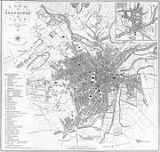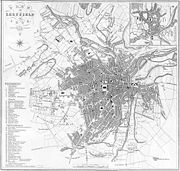
Sheffield Improvement Act 1818
Encyclopedia
The Sheffield Improvement Act 1818 is an Act of Parliament
passed in 1818 regarding the administration of the town of Sheffield
in the West Riding of Yorkshire
.
Prior to 1818, the town was run by a mixture of bodies. The Sheffield Town Trust
held responsibility for the repair of Lady's Bridge
, Barkers Pool and various highways, and had traditionally contributed to general improvements to the town. The Church Burgesses
also had the right to improve streets and bridges in the area of the church. By the nineteenth century, both organisations lacked the funds to construct significant improvements, and struggled to maintain existing infrastructure.
The Church Burgesses organised a public meeting on 27 May 1805 and proposed to apply to Parliament for an act to pave, light and clean the city's streets. The Town Trust's weak financial position was not public knowledge, and many at the meeting believed that it would be able to achieve these objectives, without the need for a new body which would have to levy rates. The proposal was defeated.
The idea of a Commission was revived in 1810, and later in the decade Sheffield finally followed the model adopted by several other towns in petitioning for an Act to establish an Improvement Commission. This was rewarded with the 1818 Act, which established the Commission and included a number of other provisions.
 The Town Trustees and the Master Cutler
The Town Trustees and the Master Cutler
were given the right to appoint a Commission of eighty members. Vacancies were filled by co-option. The Commission was mandated to improve the cleaning, lighting and watching in an area within three-quarters of a mile of Sheffield Parish Church. This covered most of the built up area at the time, but did not include the emerging suburbs. In order to fulfil their mandate, the Commission was awarded an annual levy of 1s3d in the pound on all property in the town with a rental value over £7 per year.
The watching mandate did not amount to setting up a police force, but did increase the number of watchmen and gave them new powers. By 1833, it employed fifty watchmen. They were given responsibilities for identifying obstructions to footpaths, excessive smoke emitted from chimney
s and unsafe walls, cellar
s and midden
s.
The Improvement Commission met monthly. Meetings included "appeals from individuals, debate over priorities and contested interpretation of its statutory powers".
The watch was extensively reformed in 1836. Sheffield Town Council was established in 1843, and it took over responsibility for watching the following year, establishing the Sheffield City Police in the 1850s. It absorbed the remaining powers of the Improvement Commission in the 1860s.
at Shude Hill, to provide street lighting. The company was also permitted to supply private individuals.
All owners of steam engine
s in the town were required to consume the engine's smoke
, on request, on pain of a £50 fine. This was never enforced. In addition, all occupiers were required to cleanse and sweep footways and channels in front of the premises before 10:00 on Wednesday and Saturday mornings. Those who did not comply were subject to a fine of ten shillings, and householders were regularly fined for a failure to do so.
Act of Parliament
An Act of Parliament is a statute enacted as primary legislation by a national or sub-national parliament. In the Republic of Ireland the term Act of the Oireachtas is used, and in the United States the term Act of Congress is used.In Commonwealth countries, the term is used both in a narrow...
passed in 1818 regarding the administration of the town of Sheffield
Sheffield
Sheffield is a city and metropolitan borough of South Yorkshire, England. Its name derives from the River Sheaf, which runs through the city. Historically a part of the West Riding of Yorkshire, and with some of its southern suburbs annexed from Derbyshire, the city has grown from its largely...
in the West Riding of Yorkshire
West Riding of Yorkshire
The West Riding of Yorkshire is one of the three historic subdivisions of Yorkshire, England. From 1889 to 1974 the administrative county, County of York, West Riding , was based closely on the historic boundaries...
.
Prior to 1818, the town was run by a mixture of bodies. The Sheffield Town Trust
Sheffield Town Trust
The Sheffield Town Trust, formerly officially known as the Burgery of Sheffield, is a charitable trust operating in Sheffield, South Yorkshire, England.-Mediaeval period:...
held responsibility for the repair of Lady's Bridge
Lady's Bridge
Lady's Bridge is the oldest bridge across the River Don in the City of Sheffield, England. It is located in the central section of the city, linking the Wicker to the north with Waingate to the south.-The first bridge:...
, Barkers Pool and various highways, and had traditionally contributed to general improvements to the town. The Church Burgesses
Church Burgesses
The Church Burgesses, formerly known officially as the Twelve Capital Burgesses and Commonalty of the Town and Parish of Sheffield, are a charitable organisation in the city of Sheffield in South Yorkshire....
also had the right to improve streets and bridges in the area of the church. By the nineteenth century, both organisations lacked the funds to construct significant improvements, and struggled to maintain existing infrastructure.
The Church Burgesses organised a public meeting on 27 May 1805 and proposed to apply to Parliament for an act to pave, light and clean the city's streets. The Town Trust's weak financial position was not public knowledge, and many at the meeting believed that it would be able to achieve these objectives, without the need for a new body which would have to levy rates. The proposal was defeated.
The idea of a Commission was revived in 1810, and later in the decade Sheffield finally followed the model adopted by several other towns in petitioning for an Act to establish an Improvement Commission. This was rewarded with the 1818 Act, which established the Commission and included a number of other provisions.
Improvement Commission

Master Cutler
The Master Cutler is the head of the Company of Cutlers in Hallamshire established in 1624. Their role is to act as an ambassador of industry in Sheffield, England. The Master Cutler is elected by the freemen of the company on the first Monday of September of each year and the position taken in the...
were given the right to appoint a Commission of eighty members. Vacancies were filled by co-option. The Commission was mandated to improve the cleaning, lighting and watching in an area within three-quarters of a mile of Sheffield Parish Church. This covered most of the built up area at the time, but did not include the emerging suburbs. In order to fulfil their mandate, the Commission was awarded an annual levy of 1s3d in the pound on all property in the town with a rental value over £7 per year.
The watching mandate did not amount to setting up a police force, but did increase the number of watchmen and gave them new powers. By 1833, it employed fifty watchmen. They were given responsibilities for identifying obstructions to footpaths, excessive smoke emitted from chimney
Chimney
A chimney is a structure for venting hot flue gases or smoke from a boiler, stove, furnace or fireplace to the outside atmosphere. Chimneys are typically vertical, or as near as possible to vertical, to ensure that the gases flow smoothly, drawing air into the combustion in what is known as the...
s and unsafe walls, cellar
Basement
__FORCETOC__A basement is one or more floors of a building that are either completely or partially below the ground floor. Basements are typically used as a utility space for a building where such items as the furnace, water heater, breaker panel or fuse box, car park, and air-conditioning system...
s and midden
Midden
A midden, is an old dump for domestic waste which may consist of animal bone, human excrement, botanical material, vermin, shells, sherds, lithics , and other artifacts and ecofacts associated with past human occupation...
s.
The Improvement Commission met monthly. Meetings included "appeals from individuals, debate over priorities and contested interpretation of its statutory powers".
The watch was extensively reformed in 1836. Sheffield Town Council was established in 1843, and it took over responsibility for watching the following year, establishing the Sheffield City Police in the 1850s. It absorbed the remaining powers of the Improvement Commission in the 1860s.
Other provisions
The Act established the Sheffield Gas-Light Company, with the right to construct a gasworksGasworks
A gasworks or gas house is a factory for the manufacture of gas. The use of natural gas has made many redundant in the developed world, however they are often still used for storage.- Early gasworks :...
at Shude Hill, to provide street lighting. The company was also permitted to supply private individuals.
All owners of steam engine
Steam engine
A steam engine is a heat engine that performs mechanical work using steam as its working fluid.Steam engines are external combustion engines, where the working fluid is separate from the combustion products. Non-combustion heat sources such as solar power, nuclear power or geothermal energy may be...
s in the town were required to consume the engine's smoke
Smoke
Smoke is a collection of airborne solid and liquid particulates and gases emitted when a material undergoes combustion or pyrolysis, together with the quantity of air that is entrained or otherwise mixed into the mass. It is commonly an unwanted by-product of fires , but may also be used for pest...
, on request, on pain of a £50 fine. This was never enforced. In addition, all occupiers were required to cleanse and sweep footways and channels in front of the premises before 10:00 on Wednesday and Saturday mornings. Those who did not comply were subject to a fine of ten shillings, and householders were regularly fined for a failure to do so.

